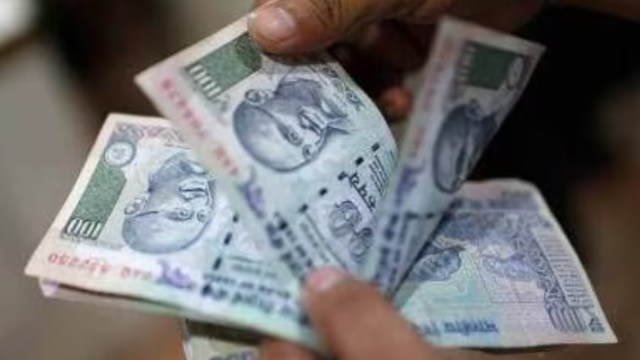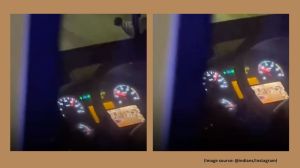Govt spent Rs 13.50 cr to operate Electoral Bond Scheme
As per the EB scheme, details of the donors and the political parties are hidden from the public. However, corporates are believed to be the biggest donors to the political parties through the bonds.
 Donors gave Rs 1,056.73 crore in 2018, Rs 5,071.99 crore in 2019 and Rs 363.96 crore in 2020, Rs 1502.29 crore in 2021 and Rs 3,703 crore in 2022, SBI had said. (Express File Photo)
Donors gave Rs 1,056.73 crore in 2018, Rs 5,071.99 crore in 2019 and Rs 363.96 crore in 2020, Rs 1502.29 crore in 2021 and Rs 3,703 crore in 2022, SBI had said. (Express File Photo)The State Bank of India (SBI), which is authorised to issue Electoral Bonds (EBs), has charged Rs 13.50 crore to the government towards commission, printing and other expenses for managing and operating the ‘Electoral Bonds Scheme’.
An amount of Rs 11.60 crore, inclusive of GST, has been levied to the government as commission so far, consequent to the sale of Electoral Bonds in 29 Phases, Department of Economic Affairs (DEA) said in its reply to a Right to Information (RTI) application filed by transperancy campaigner Commodore Lokesh K Batra (Retd).
“An amount of Rs 1,90,01,380 (inclusive of GST) has been levied to the government towards printing of Electoral Bonds till date. An amount of Rs 6,720 has been levied for ‘Device to verify Mask-Print Security’,” DEA said.
“The irony’ of the EB scheme is that while donors who buy bond are not required to pay any service charges (commission) to SBI and even printing cost of EBs, it is the government or ultimately, the tax-payers who bear this cost… for enabling transactions of ‘anonymous tax-free funding’ to political parties through the opaque Electoral Bonds Scheme 2018,” Batra said.
“In addition, there is a huge amount spent/ being spent on the use of government machinery and manpower for managing and operating EB scheme for the tax-free benefits of political parties at the tax-payers cost,” Batra said.
“The amount for printing of Electoral Bonds and for Device to verify Mask-A-Print Security was paid from the budgetary head 2052.00.090.09.01.16 under the grant of the Department of Economic Affairs,” DEA said.
Ahead of the recently-held state elections, political parties garnered Rs 1,006 crore from anonymous donors in the 29th phase of the sale of Electoral Bonds between November 6-20. As much as 94 per cent of the money was raised through the sale of Rs 1 crore denomination bonds.
As per the EB scheme, details of the donors and the political parties are hidden from the public. However, corporates are believed to be the biggest donors to the political parties through the bonds.
The total amount collected by parties through EBs has gone up to Rs 15,946 crore from various anonymous donors in 29 phases since 2018 when the Electoral Bond Scheme was introduced. The demand for Rs 1 crore denomination bond indicates that high net-worth individuals or corporates could have shelled out the money to political parties.
According to the provisions of the EB Scheme, only the political parties registered under Section 29A of the Representation of the People Act, 1951 (43 of 1951) and have secured not less than one per cent of the votes polled in the last general election to the House of the People or the Legislative Assembly are eligible to receive Electoral Bonds.
Interestingly, major political parties have not officially disclosed the amount they received through Electoral Bonds. Further, as the bonds are sold through a public sector bank, the government would come to know who is funding which political party, sources said.
Donors gave Rs 1,056.73 crore in 2018, Rs 5,071.99 crore in 2019 and Rs 363.96 crore in 2020, Rs 1502.29 crore in 2021 and Rs 3,703 crore in 2022, SBI had said.
While details of donors are exempt from RTI, SBI has only been providing the total number of EBs sold and encashed over the years and the number of parties eligible to encash EBs. On November 2, 2023, the Supreme Court ordered the Election Commission to submit data of the electoral bonds received by political parties till September 30.
Electoral Bonds are purchased anonymously by donors and are valid for 15 days from the date of issue. A debt instrument, these can be bought by donors from the bank, and the political party can then encash them. These can be redeemed only by an eligible party by depositing the same in its designated account maintained with a bank. The bonds are issued by SBI in denominations of Rs 1,000, Rs 10,000, Rs 1 lakh, Rs 10 lakh and Rs 1 crore.



- 01
- 02
- 03
- 04
- 05




























